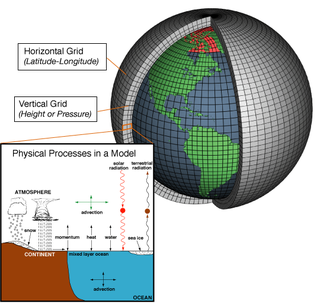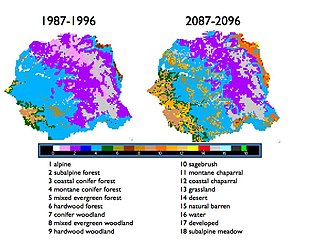
Meteorology is a branch of the atmospheric sciences, with a major focus on weather forecasting. The study of meteorology dates back millennia, though significant progress in meteorology did not begin until the 18th century. The 19th century saw modest progress in the field after weather observation networks were formed across broad regions. Prior attempts at prediction of weather depended on historical data. It was not until after the elucidation of the laws of physics and more particularly, the development of the computer, allowing for the automated solution of a great many equations that model the weather, in the latter half of the 20th century that significant breakthroughs in weather forecasting were achieved. An important branch of weather forecasting is marine weather forecasting as it relates to maritime and coastal safety, in which weather effects also include atmospheric interactions with large bodies of water.

A general circulation model (GCM) is a type of climate model. It employs a mathematical model of the general circulation of a planetary atmosphere or ocean. It uses the Navier–Stokes equations on a rotating sphere with thermodynamic terms for various energy sources. These equations are the basis for computer programs used to simulate the Earth's atmosphere or oceans. Atmospheric and oceanic GCMs are key components along with sea ice and land-surface components.
The Carl-Gustaf Rossby Research Medal is the highest award for atmospheric science of the American Meteorological Society. It is presented to individual scientists, who receive a medal. Named in honor of meteorology and oceanography pioneer Carl-Gustaf Rossby, who was also its second (1953) recipient.

The Meteorological Office, abbreviated as the Met Office, is the United Kingdom's national weather service. It is an executive agency and trading fund of the Department for Business, Energy and Industrial Strategy and is led by CEO Penelope Endersby, who took on the role as Chief Executive in December 2018 and is the first woman to do so. The Met Office makes meteorological predictions across all timescales from weather forecasts to climate change.

The Met Office Hadley Centre — named in honour of George Hadley — is one of the United Kingdom's leading centres for the study of scientific issues associated with climate change. It is part of, and based at the headquarters of the Met Office in Exeter.

Llanfairfechan is a town and community in the Conwy County Borough, Wales. It is known as a seaside resort and had a population at the 2001 Census of 3,755, reducing to 3,637 at the 2011 Census. The history of the area dates back to at least Roman times, as demonstrated by the discovery of a large second century milestone, which is now preserved in the British Museum.
Professor Sir Brian John Hoskins, CBE FRS, is a British dynamical meteorologist and climatologist based at the Imperial College London and the University of Reading. A mathematician by training, his research has focused on understanding atmospheric motion from the scale of fronts to that of the Earth, using a range of theoretical and numerical models. He is perhaps best known for his work on the mathematical theory of extratropical cyclones and frontogenesis, particularly through the use of potential vorticity. He has also produced research across many areas of meteorology, including the Indian monsoon and global warming, recently contributing to the Stern review and the IPCC Fourth Assessment Report.

Sir John Theodore Houghton was a Welsh atmospheric physicist who was the co-chair of the Intergovernmental Panel on Climate Change's (IPCC) scientific assessment working group which shared the Nobel Peace Prize in 2007 with Al Gore. He was the lead editor of first three IPCC reports. He was professor in atmospheric physics at the University of Oxford, former Director General at the Met Office and founder of the Hadley Centre.

Vicky Pope is the former head of the climate predictions programme at the Hadley Centre. She spent 6 years as manager of atmospheric climate model development and evaluation. Since October 2004 she was Head of the Climate Prediction Programme which provides independent scientific advice on climate change. Her research interests include developing and validating climate models.
HadCM3 is a coupled atmosphere-ocean general circulation model (AOGCM) developed at the Hadley Centre in the United Kingdom. It was one of the major models used in the IPCC Third Assessment Report in 2001.

Jonathan Michael Gregory is a climate modeller working on mechanisms of global and large-scale change in climate and sea level on multidecadal and longer timescales at the Met Office and the University of Reading.
The Central England Temperature (CET) record is a meteorological dataset originally published by Professor Gordon Manley in 1953 and subsequently extended and updated in 1974, following many decades of painstaking work. The monthly mean surface air temperatures, for the Midlands region of England, are given from the year 1659 to the present.

The Royal Dutch Meteorological Institute is the Dutch national weather forecasting service, which has its headquarters in De Bilt, in the province of Utrecht, central Netherlands.

Andrew John Pitman is a British-Australian atmospheric scientist.
The United Kingdom Chemistry and Aerosols (UKCA) is a community Chemistry-Aerosol-Climate model which are research runs of the Met Office's operational Unified Model. It runs within the Hadley Centre example with multiple flavours of varying horizontal resolutions and vertical layers.

A Dynamic Global Vegetation Model (DGVM) is a computer program that simulates shifts in potential vegetation and its associated biogeochemical and hydrological cycles as a response to shifts in climate. DGVMs use time series of climate data and, given constraints of latitude, topography, and soil characteristics, simulate monthly or daily dynamics of ecosystem processes. DGVMs are used most often to simulate the effects of future climate change on natural vegetation and its carbon and water cycles.
The Grantham Institute – Climate Change and Environment is one of five Global Institutes at Imperial College London and one of three Grantham sponsored centres in the UK. The Institute was founded in 2007 with a £12m donation from the Grantham Foundation for the Protection of the Environment, an organisation set up by Hannelore and Jeremy Grantham.

Dame Julia Mary Slingo is a British meteorologist and climate scientist. She was Chief Scientist at the Met Office from 2009 until 2016. She is also a Visiting Professor in the Department of Meteorology at the University of Reading, where she held, prior to appointment to the Met Office, the positions of Director of Climate Research in the Natural Environment Research Council (NERC) National Centre for Atmospheric Science and founding Director of the Walker Institute for Climate System Research.
Adam A. Scaife FRMetS FInstP is a British physicist, and head of long range prediction at the Met Office. He is also a Professor at Exeter University. Scaife carries out research into long range weather forecasting and computer modelling of the climate and has published around 200 peer reviewed studies on atmospheric dynamics, computer modelling and climate as well as popular science and academic books on meteorology.
Janet Barlow is a Scottish scientist and professor of environmental physics at the University of Reading. She is an experimental physicist who has made significant contributions to our understanding of urban meteorology, with particular regards to weather forecasting, urban sustainability, indoor and outdoor air quality, building ventilation, and environmental wind engineering.











